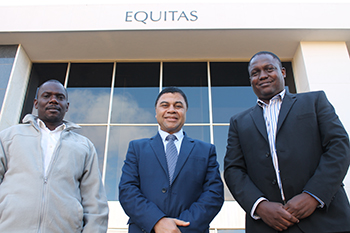Latest News Archive
Please select Category, Year, and then Month to display items
06 April 2018
Photo Rulanzen Martin
 From the left: Dr Thulisile Mphambukeli, leader of the BRICS research team that is exploring the political economy of water and food security, and her research partner, Dr Victor Okorie.
From the left: Dr Thulisile Mphambukeli, leader of the BRICS research team that is exploring the political economy of water and food security, and her research partner, Dr Victor Okorie.
A Brazil, Russia, India, China and South Africa (BRICS) delegation is to hold the 10th Annual BRICS Summit in the last week of May 2018 in Johannesburg. Dr Thulisile Mphambukeli, leader of the University of the Free State (UFS) research team alongside Dr Victor Okorie from the Department of Urban and Regional Planning, in collaboration with Prof Lere Amusan of North-West University, will ensure that water and food security is a prominent feature on the gathering’s agenda.
First, the project titled: “Exploring the political economy of water and food security nexus in BRICS and Africa” will debut at the National Institute for the Humanities and Social Sciences BRICS Think Tank Forum”.
According to Dr Mphambukeli, the key to water security is attitudinal change by means of education and conscientisation. This, she is adamant about, holds the potential to drive behavioural adjustments in the way society interacts with water.
Genetic and social approaches
Dr Okorie asserts that if strides towards reducing the demand for water were to be made, research efforts should be geared towards effecting changes at DNA level. Meaning we need to explore waterwise ways that enable crops and animals to thrive optimally.
The project also looks at social dimensions of water such as flushing a toilet. “Research activities on redesigning toilets, especially the urinal, where more than nine litres of water are used to flush less than one cubic centimetre of urine, are timely in the context of managing water and the food nexus crises,” said Dr Okorie.
Combining the genetic and social approaches would allow us to produce more with a smaller water footprint. This can be made possible by implementing precision agriculture which is about estimating and applying exact quantities of water and nutrients needed for the production of crops or the raising of livestock.
Paradigm shifting policies
Prof Amusan said the team intended to propose functional solutions that take the quality of water into consideration. Equitable production and distribution of water depends on endorsing policies of co-production between citizens, governments and the public sector. BRICS member states mutually consider water and food security as an issue of paramount significance, hence its feature on this prestigious summit’s agenda.
UFS hosts YSI for first conference of its kind in Africa
2017-06-13

From the left: Bryson Nkhoma, a doctoral student from
the International Studies Group, Prof Francis Petersen,
Rector and Vice-Chancellor of the UFS, and
Dr Tinashe Nyamunda, a postdoctoral fellow from the
International Studies Group.
Photo: Siobhan Canavan
In the first conference of its kind on the African continent, the University of the Free State’s Bloemfontein Campus was privileged to host the Young Scholars Initiative (YSI) conference.
Reflecting on the African experience
A total of 65 young and senior scholars from five continents attended the conference Decolonising Africa? The Economic History of Development, hosted by the YSI in partnership with the International Studies Group at the UFS.
The conference, held on 8 and 9 June 2017, provided an opportunity to reflect on the African experience from an historical perspective and to assess the current position of the continent in the global economy. It discussed new themes in development, such as the role of women, minorities and entrepreneurs.
The conference focused on how the business community has operated in an Africa that still faces inequalities and unfair terms of trade and lacks a unified political will.
Keynote speakers at conference
Prof Francis Petersen, Rector and Vice-Chancellor of the UFS, said decolonisation was not self-explanatory. “In its radical form, decolonisation presents two polar opposites. On the one side is white privilege and on the other is black pain.”
Prof Ian Phimister, Senior Research Professor at the Centre for Africa Studies at the UFS presented the opening keynote address entitled International Imperialism: The Violent Making of Southern Africa, 1884-1914.
Other keynote speakers included Prof Sabelo Ndlovu Gatsheni from the University of Pretoria, Prof Gareth Austin from the University of Cambridge, and the closing keynote by Prof Alois Mlambo from the University of Pretoria.